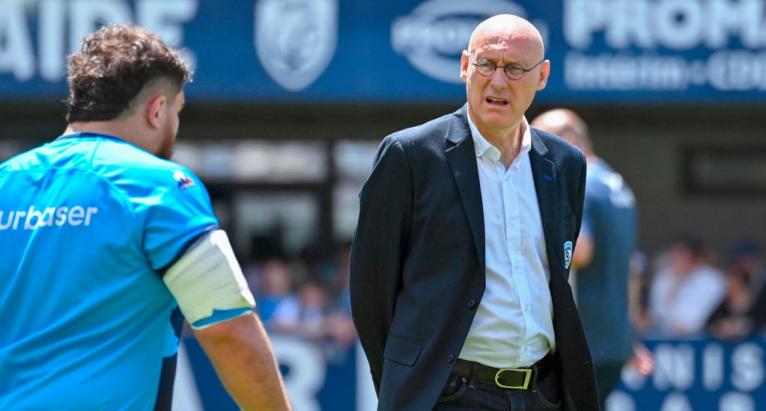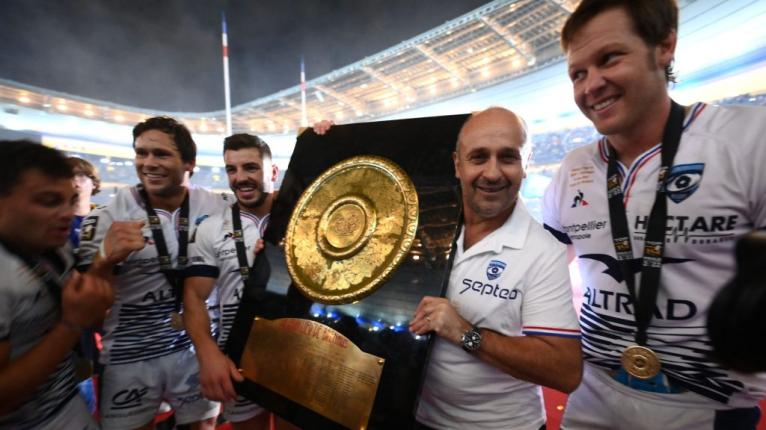It is almost a year to the day since the 2023 Rugby World Cup began. France beat New Zealand in the opening match at a euphoric Stade de France, and the state of the sport in the country had never seemed healthier.
Twelve months on and the spirits of French rugby have possibly never been lower. Aside from the men’s sevens squad winning Olympic gold, it has been a summer of unmitigated woe for the French Rugby Federation (FFR).
Two of the French squad who toured Argentina in July are being investigated over allegations they violently raped a woman on the evening of France’s first Test win over the Pumas. The pair deny the charges. They had been held in Argentina for almost two months, until being allowed to return home on Wednesday.

Another tourist, Melvyn Jaminet, was sent home in disgrace after posting a racist video on social media, and he has been suspended by the FFR for 34 weeks and fined €30,000.
But the most catastrophic event was in South Africa last month when a member of the France Under-18 squad, Medhi Narjissi, in the country for a tournament, was swept out to sea from a Cape beach during a squad recovery session.
In a harrowing press conference last week, Medhi’s father, Jalil, who played professionally for Castres and Agen, accused the FFR of a dereliction of duty both during and after the death of his son. The public prosecutor in Agen is expected to soon open a judicial investigation into the disappearance of 17-year-old Medhi.
In recent years French rugby has been entangled in a series of its own scandals, which have been splashed across the newspapers; sordid stories of alcohol and drug abuse, not to mention domestic and racial abuse.
The summer crises have crystallised a growing sentiment within France that rugby’s ‘valeurs’ are being eroded. The sport’s values were always its key selling point, a way for administrators and marketers to promote the sport by contrasting it to French football, plagued by a series of scandals earlier in the century.
But in recent years French rugby has been entangled in a series of its own scandals, which have been splashed across the newspapers; sordid stories of alcohol and drug abuse, not to mention domestic and racial abuse.

Professional rugby in France is experiencing the same growing pains English football went through a quarter of a century ago. In the decade after the Premier League was launched in 1992, money flooded into the game and players earned riches beyond their wildest dreams. Consequently, the likes of John Terry, Paul Gascoigne, Tony Adams, Robbie Fowler and Stan Collymore were as much on the front pages of the tabloids as the back ones.
The generation that followed are rarely in the papers for the wrong reasons; they, their clubs and the Football Association have a far better understanding that being a role model brings with it responsibility. It’s something professional rugby is also learning.
For England, the lesson was learned in 2011 when their World Cup squad acted more like a student touring side than a professional outfit in New Zealand. Martin Johnson, their manager at the time, famously tried to brush off the allegations of lewd behaviour by telling reporters: “Rugby player drinks beer: shocker.”
That flippant retort demonstrated Johnson was stuck in the amateur mindset. Student touring teams can go to the local pub and toss a dwarf; players representing their country in the sport’s showpiece tournament have to act with a little more sobriety, maturity and responsibility.
A mother of a prominent French player in the Top 14, speaking anonymously, told L’Equipe her son – like others – had suffered mental health issues during his professional career but his plight went ignored.
Many in France were surprised to discover the players were allowed to go out partying after that first Test in Argentina; there was a midweek game against Uruguay and then the second Test seven days later.
That may have been one of the points discussed last Thursday when 30 of the most powerful and influential figures in French rugby convened at the national training centre at Marcoussis; among those present were Florian Grill, president of the FFR, Rene Bouscatel, president of the LNR, the Top 14’s governing body, Fabien Galthie, representatives from the players’ trade union, numerous Top 14 club presidents and directors, and also figures from the amateur game.
They were there, according to the newspaper L’Equipe, to ‘brainstorm’ in order to produce solutions to salvage the reputation of rugby in France.
Bouscatel and Grill spoke to L’Equipe prior to the meeting and admitted there were serious problems to address, which in their view afflicted not just French rugby but also society as a whole.

Another who gave his opinion to the newspaper was the former France player and head coach Philippe Saint-Andre. “More work must be done with the development of young players without being afraid to punish them when mistakes are made but also managing their post-match behaviour in a completely different way,” he said. “One can no longer behave as one once did.”
The FFR have announced a ‘plan of action’ for October, but some clubs are already taking the initiative: this week Bordeaux announced the introduction of random drug testing for players, a measure also adopted by Racing 92.
It is not just the players who need to change their approach. A mother of a prominent French player in the Top 14, speaking anonymously, told L’Equipe her son – like others – had suffered mental health issues during his professional career but his plight went ignored. “Nobody wants to see it,” she said. “Those players who show alarming signs are not screened. Many coaches don’t appreciate the intervention of a psychologist.”
In France, players still often suffer in silence and alone, turning to drugs and alcohol in despair.
In this regard French rugby is years behind its Anglophone rivals. All Black great John Kirwan was knighted for his services to the game and for raising awareness about mental health in 2012. That same year Bath and England prop Duncan Bell revealed he had spent most of his career suffering from depression, an admission which encouraged other British players to come forward with their own stories of mental health struggles.
In France, players still often suffer in silence and alone, turning to drugs and alcohol in despair. The Top 14 is the richest and most glamorous domestic league in rugby but that brings with it pressures that can be unendurable for young men, particularly in the cruelly unforgiving age of social media.
Some Top 14 clubs are aware of this aspect of the professional game; Toulouse, for example, have a psychologist who works with the players in managing the pressures on and off the pitch.
According to Monday’s Midi Olympique, everyone who attended last Thursday’s meeting at Marcoussis recognised the gravity of the crisis afflicting French rugby. The discussion took place against the backdrop of next month’s election for the FFR presidency.
The incumbent, Grill, faces a strong challenge from the former France back, Didier Codorniou, who has tabled a motion of no confidence in his rival. “What these summer tours revealed was that there was a lack of people of authority to accompany the French teams,” he said recently.
Whoever wins the election on 19th October will be confronted by a towering in-tray which requires urgent action. As FFR secretary general Sylvain Deroeux admitted to Midi Olympique on Monday, French rugby is ‘burning from the inside’.

